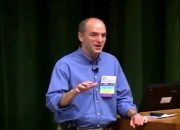[62 min 56 sec] – John Woolard is addressing the challenges we face as we look at the growing requirements for energy across the world and the role of renewable energy in meeting these future needs. One of the key issues discusses is how to meet the needs for high quality power with low carbon generation sources as we deal with the intermittency of renewable power. BrightSource Energy is currently building the largest solar power plant in the world, which will provide a useful case study about the financing and project development challenges that need to be confronted with this type of project.
John Woolard is president and CEO of BrightSource Energy, a developer of utility-scale solar power plants. In this role, he brings more than two decades of experience in the energy technology sector as an executive, entrepreneur, and investor. BrightSource Energy is currently building the largest solar power plant in the world. Prior to joining BrightSource Energy, Woolard co-founded Silicon Energy, one of the first successful clean tech companies, and was president, CEO, and chairman of the board from 1997 to 2003. Woolard joined the executive team at Itron, Inc. in 2003 following its acquisition of Silicon Energy, and held the positions of vice president and vice president of strategy and business development for Software Solutions. He previously held positions with VantagePoint Venture Partner’s CleanTech Group, Lawrence Berkeley National Labs, and Pacific Gas & Electric Company. Woolard is a Henry Crown Fellow at the Aspen Institute and he currently serves on the advisory boards of the Tuolumne River Preservation Trust, as well as the Energy Institute and Lester Center for Entrepreneurship at Berkeley-Haas. He is also a member of the Oakland Zoo’s East Bay Zoological Society Board of Trustees. In addition to his MBA from the Haas School of Business, Woolard holds two degrees from the University of Virginia, including an MA in environmental planning and a BA in economics.
